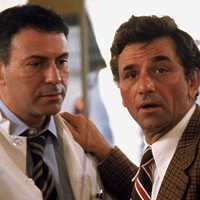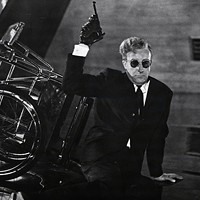(View From The Couch is a weekly column that reviews what's new on Blu-ray and DVD. Ratings are on a four-star scale.)
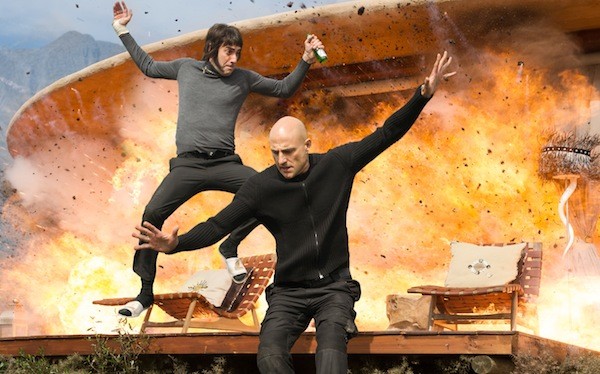
-
Sacha Baron Cohen and Mark Strong in The Brothers Grimsby (Photo: Columbia)
THE BROTHERS GRIMSBY (2016). Most movies, even the generally unique ones, can't help but stir memories of past pictures, whether through similar plots, characters, art direction or what-have-you. The Brothers Grimsby turns to its permeating sense of crassness to bring to mind such one-star atrocities as The Love Guru, Freddy Got Fingered, and Tim and Eric's Billion Dollar Movie — comparisons that make this new picture a Chernobyl of comedy. Sacha Baron Cohen, best when he's making mockumentaries, tends to flail when appearing in other types of pictures, and The Brothers Grimsby (which he co-wrote) represents his most misguided effort yet. He stars as Nobby, a soccer-crazed layabout who learns that his younger brother Sebastian (Mark Strong), whom he hasn't seen in decades, is actually a world-class secret agent. Nobby's sudden presence in Sebastian's life leads to the spy being mistaken as a double agent, and he'll need his bumbling sibling's help to clear his name and nab the real criminals. The espionage genre was sent up in splendid fashion in last year's Spy, but this latest effort fails to generate any laughs, with Cohen relying on a series of gross-out gags that reek of desperation rather than inspiration. The comic centerpiece is the scene in which the siblings find themselves hiding inside the vagina of an elephant that's in the process of getting gangbanged — it's no more imbecilic than the scene in which Nobby has to suck poison out of Sebastian's left testicle, or the sequence in which Nobby shoves a firecracker up his posterior, or the countless scenes in which Nobby loves his new gun so much that he kills innocent people with it (these bits will doubtless be lovingly shown on a loop at the next NRA convention). Thumbs up to the Trump gag, though.
Blu-ray extras include a making-of featurette; deleted scenes; a blooper reel; and a, umm, closer look at the elephant sequence.
Movie: *
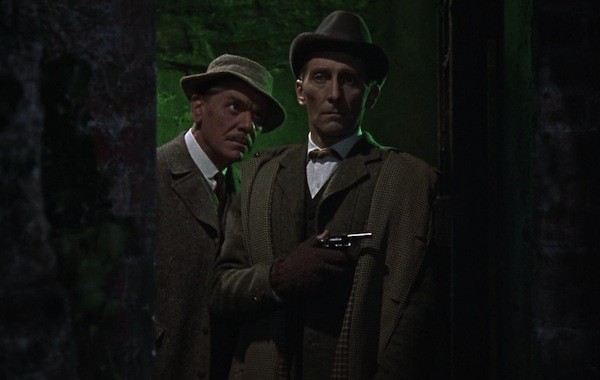
-
Andre Morell and Peter Cushing in The Hound of the Baskervilles (Photo: Twilight Time)
THE HOUND OF THE BASKERVILLES (1959). Of the countless film and television versions of the venerable Sherlock Holmes tale penned by Sir Arthur Conan Doyle — a story that's been interpreted by various actors from Basil to Benedict — the worst would have to be the atrocious, practically unwatchable 1978 spoof starring Peter Cook as Holmes and Dudley Moore as Dr. Watson. And the best? For that, look no further than this handsome and exciting adaptation from the same studio (Hammer), director (Terence Fisher) and stars (Peter Cushing and Christopher Lee) that had all exploded onto the international scene with 1957's The Curse of Frankenstein and 1958's Horror of Dracula (and would soon reunite for The Mummy later in '59). The film opens with the arrogant and entitled Sir Hugo Baskerville (David Oxley), the Brock Turner of his time, engaging in rape and other crimes, activities that lead to a curse forming around his family name. The curse manifests itself well down the line, when it leads to the death of Sir Charles Baskerville and threatens to also visit the new heir, Sir Henry Baskerville (Lee). Enter the intrepid Sherlock Holmes (Cushing) and his faithful sidekick Dr. Watson (Andre Morell), both doing their damnedest to make sure Sir Henry stays alive. Cushing is splendid as Holmes — perhaps less eccentric than other screen Holmes but certainly no less committed — while it's nice to see Lee in a rare good-guy role. Fisher would later helm another Sherlock flick, 1962's Sherlock Holmes and the Deadly Necklace — this time, Lee would have the honor of playing the brilliant sleuth.
Blu-ray extras include a pair of audio commentaries by film historians David Del Valle, Steven Peros, Paul Scrabo, Lee Pfeiffer and Hank Reineke; an interview with Lee; Lee reading excerpts from Doyle's story; and an isolated track of James Bernard's score.
Movie: ***1/2
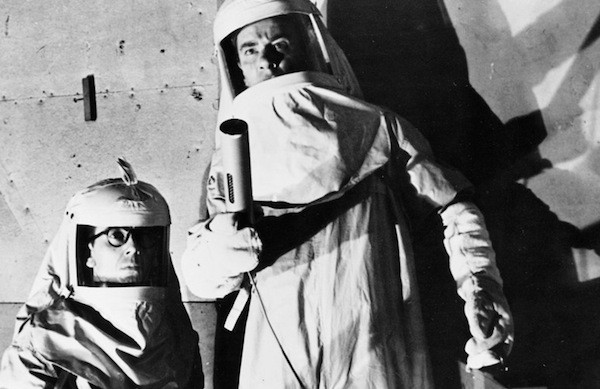
-
King Donovan and Richard Carlson in The Magnetic Monster (Photo: Kino)
THE MAGNETIC MONSTER (1953). What sounds like a ludicrous exercise in 1950s sci-fi actually turns out to be a fairly involving thriller ... even if there really isn't a monster in the traditional sense. Fantasy flick mainstay Richard Carlson (Creature from the Black Lagoon, It Came from Outer Space) is in his element as Dr. Jeffrey Stewart, a member of the government's OSI branch. OSI stands for Office of Scientific Investigation, and the set-up amusingly brings to mind an early version of the investigative outfit seen weekly in The X-Files. Instead of Fox Mulder or Dana Scully, though, Dr. Stewart's partner is Dr. Dan Forbes (Invasion of the Body Snatchers' King Donovan), and together they set off to discover why various items in the vicinity are suddenly becoming magnetized. Their sleuthing eventually leads them to a dying scientist (Leonard Mudie) and his creation, a radioactive isotope that continues to grow as it devours energy and, if not stopped, might soon knock the earth out of its orbit. The climax is primarily comprised of footage lifted from the 1930 German film Gold (which coincidentally was itself released on Blu-ray just last month), but narratively, it's a seamless blend with the script concocted by notable horror veteran Curt Siodmak (The Wolf Man, I Walked with a Zombie). And, yes, that's an impossibly young Strother Martin (Cool Hand Luke, Sssssss) in a few scenes as the co-pilot of an endangered airplane.
Blu-ray extras consist of audio commentary by film historian Derek Botello and trailers for The Magnetic Monster, Donovan's Brain (already available from Kino on Blu-ray), Journey to the Seventh Planet (ditto) and Invisible Invaders (due July 12).
Movie: **1/2
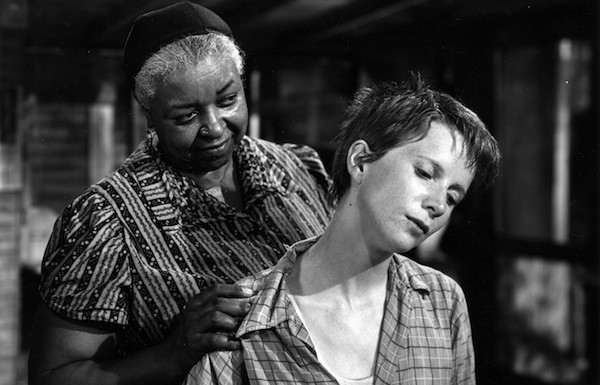
-
Ethel Waters and Julie Harris in The Member of the Wedding (Photo: Twilight Time)
THE MEMBER OF THE WEDDING (1959). All of 27 at the time, Julie Harris made her film debut playing a 12-year-old girl in this adaptation of Carson McCullers' 1946 novel and its subsequent Broadway adaptation. She plays the "unjoined" Frankie Addams, a tomboy who spends most of her time grappling with her oversized emotions while hanging out with her young cousin John Henry (Brandon de Wilde) and her family's black maid Berenice (Ethel Waters). Feeling like she doesn't belong anywhere — she's not a member of anything, including the clique of neighborhood girls who haughtily look down on her — she decides that she's in love with the love exemplified by her brother (Arthur Franz) and his bride (Nancy Gates); hence, she's going to live happily ever after with the pair, a union she expects will commence as the three of them head off on the honeymoon. The distance from the stage might have made the acceptance of the adult Harris as a young child easier; the proximity of the camera makes it impossible to ignore that she's too old for the part. Nevertheless, she earned a Best Actress Oscar nomination for her performance, admittedly a tad too mannered and theatrical for my taste (though it's easy to see how she became a legendary actress in the theater). The real acting fireworks come from the remarkable Waters (like Harris and de Wilde, imported over from the Broadway production), who allows her character to alternately function as mother, confidante, protector and devil's advocate.
Blu-ray extras include audio commentary by sing-songwriter Suzanne Vega and film historians Derek Botelho and David Del Valle; separate audio commentary by Carson McCullers biographer Virginia Spencer Carr; a featurette on McCullers; and a discussion of the property by actor Kevin Spacey and Karen Kramer, wife of the film's producer, Stanley Kramer.
Movie: ***
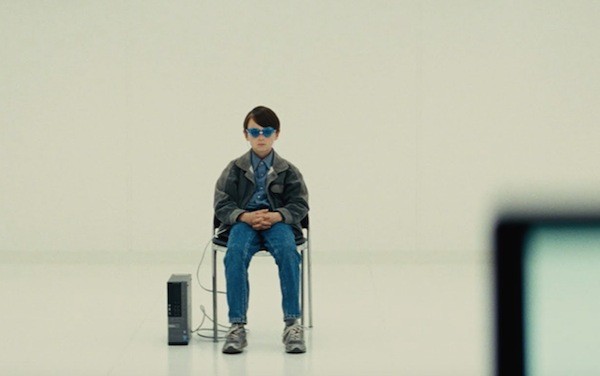
-
Jaeden Lieberher in Midnight Special (Photo: Warner Bros.)
MIDNIGHT SPECIAL (2016). After making his debut with the flawed but moderately interesting Shotgun Stories, writer-director Jeff Nichols enjoyed great critical success with his next two features, the indie gems Take Shelter and Mud. Yet despite securing the backing of a major studio in Warner Bros., the auteur's latest is a step back, and his likely Nolan- or Aronofsky-like breakthrough will have to wait a little while longer. Michael Shannon, Nichols' go-to actor, here plays Roy, the father of a boy with unique powers. Alton (St. Vincent's Jaeden Lieberher) is able to transmit a blinding light from his eyes and allow people to witness various types of visions; he can also identify strangers by name and knows when others are spying on him. Is he an alien or just a kid with unusual gifts? Whatever the answer, Roy, his estranged wife Sarah (Kirsten Dunst) and his former childhood friend Lucas (Joel Edgerton) have all vowed to protect him from those in pursuit, whether government agents or members of a religious cult headed by Alton's adoptive father Calvin (Sam Shepard). Nichols' decision to play it close to the vest and keep the story shrouded in mystery initially works, but as the film progresses and little comes into focus, it becomes apparent that his script ultimately isn't ambiguous so much as underwritten, with an ending that proves to be particularly disappointing.
Blu-ray extras include background information on the five principal characters (Alton, Roy, Sarah, Lucas and Sevier, an NSA agent played by Adam Driver) through interviews with Nichols and his cast — info that, incidentally, would have been appreciated had it been included in the actual movie — and a discussion surrounding the film's themes.
Movie: **1/2
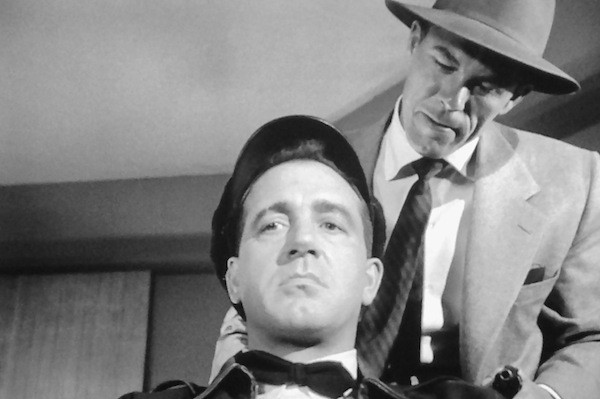
-
John Payne and Jack Lambert in 99 River Street (Photo: Kino)
99 RIVER STREET (1953). Has any other cinematic genre offered as many buried treasures as film noir? Here's another unpolished gem to add to the stack, a bruising beauty that makes quota in the requisite areas of femme fatales, tantalizing double-crosses, sordid murders, and existential anti-heroes. Director Phil Karlson and actor John Payne, who teamed in 1952 for the excellent noir offering Kansas City Confidential (available on Blu-ray and previously reviewed in this column), are back together again for this grim account of Ernie Driscoll (Payne), a former boxer who just missed out on a championship ring and now has to make a meager living as a cab driver. His wife Pauline (Peggie Castle), angry at how her life has turned out, steps out behind his back with a slick character named Victor Rawlins (Brad Dexter), a hoodlum who has just pulled off a diamond heist. Ernie himself is no angel: While his relationship with aspiring actress Linda James (Evelyn Keyes) is purely platonic, he does possess a hot temper that threatens to repeatedly land him in trouble. In fact, he's the perfect patsy for a scheme that will result in a corpse conveniently stashed in his taxi cab. Noir vet Jack Lambert is suitably menacing as a slap-happy hood; amusingly, Frank Faylen, best known as the friendly cab driver Ernie in Frank Capra's It's a Wonderful Life, here plays the friendly cab company dispatcher Stan.
Blu-ray extras consist of audio commentary by film historian Eddie Muller and trailers for 99 River Street as well as three other noirs available on Blu-ray (two newly arrived this week) via Kino: He Ran All the Way (written by the blacklisted Dalton Trumbo and starring John Garfield), Hidden Fear (also starring Payne) and Shield for Murder (with Edmond O'Brien).
Movie: ***1/2
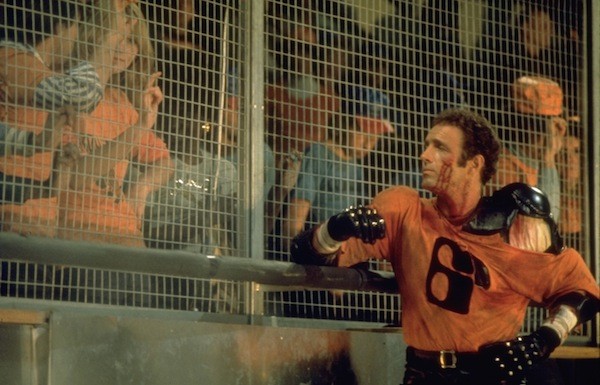
-
James Caan in Rollerball (Photo: Twilight Time)
ROLLERBALL (1975). In the wake of Watergate and Vietnam, it was probably no surprise to find that the science fiction films of the 1970s — at least those before the Star Wars revolution in 1977 — almost all took place in futures in which murder is state-sanctioned, individual rights have been eroded, and paranoia reigns supreme. Like Soylent Green, Logan's Run and the Planet of the Apes sequels (to name but a bare minimum), Rollerball falls into this category, centering on a United States being ruled solely by corporations (the film is set in 2018, but it already speaks mighty loud to 2016). Wars are no more, but to keep the populace titillated, the game of Rollerball (basically a cross between roller derby and hockey) has been created to satisfy bloodlust as well as hammer home the point that individual achievement is insignificant in this brave new world. But a problem arises when Jonathan E. (James Caan), the sport's greatest player, has emerged as a celebrity in his own right; in an effort to quell the ideas that his solo efforts might inspire, the powers-that-be (repped primarily by a suitably pontifical John Houseman) decide that he must immediately retire from the game ... or else. Director Norman Jewison has far more luck with his staging of the Rollerball matches (they're at once exciting and horrifying) than scripter William Harrison has in condemning this futureworld with anything more than boilerplate lip service. If nothing else, the film is at least much preferable to the wretched 2002 remake starring Chris Klein and LL Cool J.
Blu-ray extras include audio commentary by Jewison; separate audio commentary by Harrison (who adapted his own short story, Roller Ball Murder); vintage behind-the-scenes featurettes; and an isolated music track.
Movie: **1/2
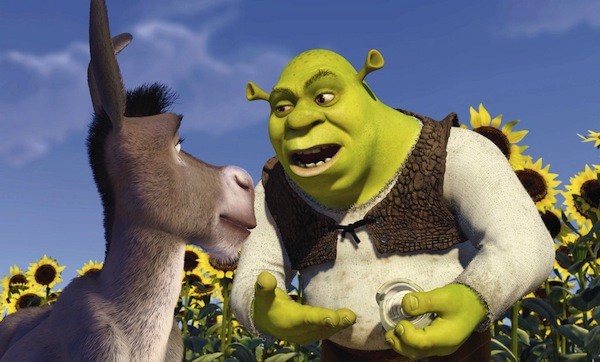
-
Shrek (Photo: DreamWorks)
SHREK (2001). The first Oscar for Best Animated Feature went to this fractured fairy tale, an absurd choice to those of us who believed (and still do) that Pixar's Monsters, Inc. was that year's best — and most timeless — toon flick. Still, this is nevertheless a snappy comedy that manages to stick it to the entire genre, thanks to such scenes as Gepetto selling Pinocchio for reward money and Snow White and Cinderella getting into a slapping match. The main focus, though, is a half-conventional, half-original tale about an ogre (voiced by Mike Myers) who finds himself being tricked by the evil Lord Farquaad (John Lithgow) into rescuing a princess (Cameron Diaz) from a fire-breathing dragon. In what became an unfortunate trend that continues to this day, the modern breed of animated features relies a bit too much on crude gags and up-to-the-minute pop-culture references rather than on a magical sense of eternal appeal — Shrek falls into that camp, and even a mere decade-and-a-half later, much of it feels dated. But there remains much to enjoy, including the pleasing animation and a zesty vocal performance by Eddie Murphy as Shrek's wisecracking donkey sidekick (basically reprising his zesty vocal performance as Mulan's wisecracking dragon sidekick).
Blu-ray extras on this 15th Anniversary Edition include audio commentary by directors Andrew Adamson and Vicky Jensen and producer Aron Warner; deleted scenes; a piece on Donkey; and music videos for Smash Mouth's "I'm a Believer" and Baha Men's "Best Years of Our Lives." DreamWorks has also just released a 15th Anniversary Shrek 4-Movie Collection that also contains the sequels Shrek 2, Shrek the Third and Shrek Forever After.
Movie: ***

-
William Shatner, DeForest Kelley and Leonard Nimoy in Star Trek (Photo: Paramount & CBS)
STAR TREK: THE ORIGINAL SERIES (1966-1969) / STAR TREK: THE NEXT GENERATION (1987-1994). As noted in last week's column, Paramount is going almost all out with its 50th Anniversary festivities for its enduring Star Trek franchise. True, there's no Director's Cut of Star Trek: The Motion Picture being offered for the first time in this format (tsk tsk), but there is the debut of the Director's Cut of Star Trek II: The Wrath of Khan, as well as the studio's initial stab at 4K Ultra HD titles via the 2009 Star Trek reboot and its sequel, Star Trek Into Darkness. On the TV front, the big news this month is the opportunity for viewers to purchase Star Trek: The Original Series and/or Star Trek: The Next Generation in complete, full-season sets (previously, seasons for each series were only available individually).
Neither series really needs an introduction. ST:TOS is a bona fide television milestone, and its influence on pop culture cannot be underestimated. Gene Roddenberry's brain child succeeded because of its great roster of characters — principally, Captain James T. Kirk (William Shatner), Mr. Spock (Leonard Nimoy) and, my fave, Dr. McCoy (DeForest Kelley) — as well as its often thoughtful approach to science fiction. A fan favorite that was nevertheless cancelled after a mere three seasons, it was also revered by critics and even industry insiders, as noted by its two consecutive Emmy Award nominations for Best Dramatic Series (losing to Mission: Impossible both times) and three consecutive nominations for Nimoy as Best Supporting Actor. The classic episodes are many — "The City on the Edge of Forever," "The Trouble with Tribbles," "Space Seed" (the predecessor to Star Trek II: The Wrath of Khan), "Amok Time," etc. — as are the famous catchphrases, memorable gadgets, and subsequent conventions.

-
Michael Dorn and Patrick Stewart in Star Trek: The Next Generation (Photo: Paramount & CBS)
While interviewing Shatner on the Star Trek IV: The Voyage Home L.A. film junket for my college newspaper back in 1985, the actor was asked his opinion on the then-in-preproduction Star Trek: The Next Generation. "I think it's a mistake," he replied. "I think to call the series Star Trek is an error which will overexpose the name and the possibility of not having the Star Trek quality. So it remains to be seen. But I think the whole thing is an unnecessary jeopardy." (Nimoy was asked the same question on the junket and was more diplomatic in his answer, stating that it had potential and to wait and see.) Shatner, of course, was proven wrong, given that ST:TNG ran even longer than the original show and in many quarters is considered the superior Star Trek franchise. Certainly, Patrick Stewart's performance as Captain Jean-Luc Picard is a master class in acting — despite the show finally landing a Best Drama Series Emmy nomination for its last season, Stewart was snubbed all seven years, an oversight perpetually greeted with much controversy and criticism. Yet for all its impressive visual effects and effective plotting (two words: The Borg), the series never fired my imagination quite like the original run. But that's ultimately neither here nor there for die-hard Trekkies who've been holding out on both box sets until the prices became more reasonable — as they have with these all-inclusive editions.
The Blu-ray extras in both box sets are the same that were available on the single-season releases. Extras on ST:TOS include the option to watch the episodes with original or enhanced special effects; the long-unseen original pilot episode "The Cage" (with different characters aside from Mr. Spock); retrospective making-of pieces; cast interviews; behind-the-scenes footage; and more. Extras on ST:TNG include audio commentaries on select episodes; retrospective making-of pieces; cast and crew interviews; gag reels; and more.
Star Trek: The Original Series: ***1/2
Star Trek: The Next Generation: ***
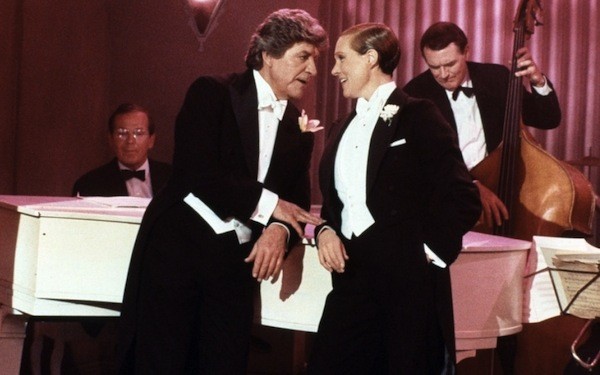
-
Robert Preston and Julie Andrews in Victor/Victoria (Photo: Warner Bros.)
VICTOR/VICTORIA (1982). From the successful Pink Panther series to dramas like Days of Wine and Roses and Breakfast at Tiffany's, the late Blake Edwards had directed, written and/or produced so many important and popular films that it's hard to believe he only earned a solitary Academy Award nomination throughout his entire career (wisely, the outfit later gave him an Honorary Award in 2004 for his body of work). The sole bid was for his writing prowess on this cheerful romp, a critical and commercial hit starring his wife Julie Andrews as well as veteran Robert Preston, who had delivered a comic performance for the ages the previous year in Edwards' S.O.B. Adapted from a 1933 German film, Victor/Victoria stars Andrews as Victoria Grant, a struggling, starving singer in 1930s Paris. She befriends a gay nightclub performer known as Toddy (Preston), who in turn comes up with the idea that Victoria can make a living as a female impersonator — in essence, she's a woman pretending to be a man pretending to be a woman. The ruse works wonderfully until "Victor" catches the attention of powerful Chicago mobster King Marchand (James Garner), who can't understand why he's more attracted to this "man" than to his jealous moll Norma (Lesley Ann Warren). Top production values and spirited performances (particularly by Preston) render this irresistible. Nominated for a total of seven Academy Awards (in addition to Edwards for Best Adapted Screenplay, other nods included Andrews as Best Actress and both Preston and Warren in supporting slots), this won for Best Adaptation Score.
Blu-ray extras consist of audio commentary by Edwards and Andrews, and the theatrical trailer.
Movie: ***1/2

